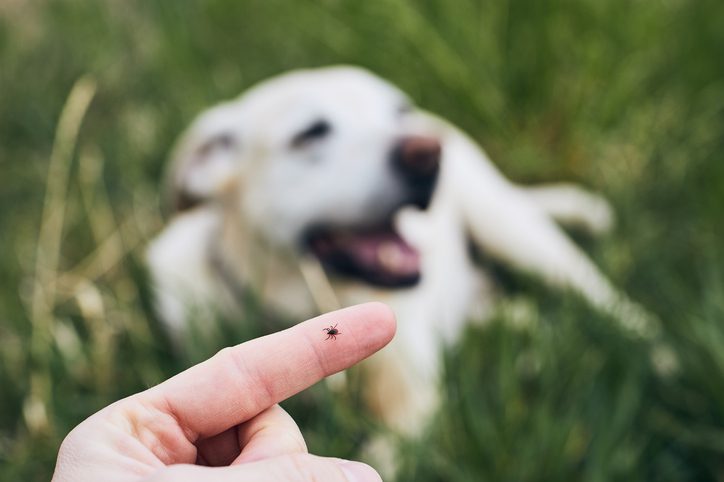Parasite Prevention for Dogs: Why This is Important for Your Pet in Saratoga Springs, NY
Parasite prevention is very important in dogs! When we talk about parasites, we should divide them into two categories. First are the external parasites: fleas, ticks, mites, and in rare instances lice. Second, are the internal parasites. Most live within the dogs’ intestinal tract, and include hookworms, whipworms, roundworms, giardia, and coccidia. Others live with the vascular system (the bloodstream); heartworm, Lyme, anaplasma, and ehrlichia. There are others in both categories, however, they are very rare.
Pet owners should test their animals for internal parasites on at least an annual basis. While some parasites create minor problems for our pets, others can make them quite ill. It is also important to remember that some parasites can be transmitted to people, and, as we are not the intended host, the invaders can cause very serious issues within our eyes and liver. These instances are rare here in the United States, but they are common problems in developing countries.
At Saratoga Veterinary Hospital, we test for vascular parasites with bloodwork, which is done at least every 2 years. With the rise in cases of tickborne diseases in many animal species, monitoring what’s happening to your pet can serve as an early warning system for you and your family. For that reason, we are testing more and more pets annually.
Thankfully, there are many ways to prevent parasites from infecting your pet. Keep on reading to find out more information about parasite prevention for dogs in Saratoga Springs and Wilton, NY and why these treatments and methods are so important!

Where Are the Little Devils?
Dogs come into contact with most intestinal parasites through fecal material or soil contaminated from fecal material. Most of the time, the transmission is fecal to oral. Your pet sniffs another dog’s stool and their nose or lips come into contact with parasites’ eggs in the stool. Then, they lick their own nose and ingest the eggs. The game is afoot.
Speaking of “feet”; that is another entry point. Hookworms’ larvae penetrate through the foot pads of our pets. All they have to do is walk through an area where the eggs were left behind by another dog. The stool may have disintegrated, but the eggs and larvae remain. And remember, “dog” can include foxes and coydogs, which are all around us and wander through our backyards. Don’t believe me; install a camera and you’ll be amazed by the visitors you’ll see at 3 a.m.!
External parasites are all around us as well. Ticks are ubiquitous here in the Northeast. Fleas are prevalent in some places and mostly absent in others. It doesn’t matter if you’re walking in Congress Park or on the Skidmore Trails in Saratoga Springs, on a trail in Wilton, or in Crandall Park in Glens Falls; these little critters will find their way to your pet.
How to Prevent Parasites in Dogs
Common ways to prevent parasites in dogs include using medications to protect your pet and checking for parasites frequently so that they can be treated and eliminated quickly. Listed below are tips to help prevent them.
Limit Your Pet’s Exposure to Parasites Outside
We all love to enjoy the outdoors with our pets. Be aware that during the warmer months (temperatures above 40 degrees Fahrenheit), mosquitoes, fleas and ticks will be active. Ticks are the sneaky ones. They begin to become very active earlier than most people realize and increase their activity in the fall. Starting to use prevention in April is reasonable in most years. The last dose of flea/tick prevention should be given in December.
Some of the intestinal parasites are even infectious during the winter months. Some of these parasites’ eggs overwinter without issue and that is why we advise year-round heartworm preventative use. Heartworm preventatives also rid your pet of intestinal parasites. Unlike a flea/tick product, heartworm medications work “backwards”. When you give the treatment, it eliminates parasites that your pet may have acquired during the last 30 days.
It is best to routinely check your pets for ticks and fleas after any outside activity. Early detection leads to rapid elimination. Also, remember to promptly remove stool from the yard so that your yard and soil do not become a reservoir of parasites.
Keep Your Dog Protected with Parasite Prevention
Most of the common parasites can be prevented or eliminated with the use of proven safe and effective parasite prevention medications that are administered once a month.
When it comes to administering these medications, we generally adhere to a “less is more” thought process. The lowest effective dose that gets the job done is better given on a monthly basis than a drug that lasts longer. Remember, we are talking about chemicals and pesticides here and we believe that, in most cases, keeping the dose minimized even if it means more frequent administration is the safer route to travel.
This ensures that your pet has optimal protection against heartworms, hookworms, fleas, ticks, giardia, and much more all year-round.
At Saratoga Veterinary Hospital, we offer a variety of quality parasite preventatives, including Heartgard Plus, NexGard, and Frontline Plus.
For heartworms and intestinal worms, we recommend using Heartgard Plus, a chewable monthly treat. For fleas, ticks and mites we recommend Nexgard, also a chewable monthly treat. We also carry Vectra and Frontline which are applied topically on a monthly basis for the few dogs that cannot use Nexgard. Occasionally, we find pets who have GI issues with Nexgard and the product is not for use in any pet who has experienced a seizure
Always consult with your vet before trying a new parasite preventative on your pet.
Vaccinate Your Dog Against Lyme Disease
There are only two vaccines that enter the parasite equation, and only one is worth talking about.
A vaccine for giardia was developed but fell out of favor as the disease itself doesn’t generally cause significant enough signs to warrant constant vaccination.
The one worth talking about is the vaccine for Lyme Disease. Our hospital offers the Lyme vaccine for dogs. As the name implies, the vaccine helps to increase your pet’s immunity to Lyme disease. We are vaccinating against the offending organism, Borrelia burgdorferi. Your dog should be vaccinated for Borrelia in our area with very few exceptions.
The disease is endemic in Saratoga Springs, NY, because of ticks. Any tick can carry Borrelia, even though the tick Ixodes gets most of the blame. Whether your dog currently tests negative or is already positive, the vaccine provides additional layers of protection that natural exposure to the disease does not.
Stick with me on this. It only gets a little muddy. Think of it as the Borrelia wearing red coats while inside the tick and changing to blue coats once inside the dog. The dog only ever forms blue antibodies when exposed because that’s all their immune system ever sees. We want red antibodies to kill the organism inside the tick, before it reaches the dog in the first place. Whether it’s a first exposure or a re-exposure, the dog benefits by the reduction of the “red coats”. The vaccine supplies the dog with both “coat colors” and gets us the antibodies we want. The dogs immune system has less to fight once it sees the “blue coats”. That means less inflammation, which is the underlying cause of all the problems that Lyme Disease creates from fever, to joint swellings, to kidney damage.
In Saratoga Springs, NY, we recommend this vaccine for many of our canine patients.
Symptoms of Parasites
Even with preventative techniques, your dog can still get parasites. This is because the medications are not always 100% effective, and do not protect against every possible parasite.
If your dog ends up with parasites, you may notice symptoms such as:
- Lethargy
- Vomiting or diarrhea
- Coughing
- Exercise intolerance (easily winded)
- Blood in the stool (can appear either red or tarry)
- Visible worms in stool
- Weight loss
- Irritated or itchy skin
- Dark “pepper-like” material in the haircoat
- Visible ticks or fleas in the haircoat
Contact Us in Saratoga Springs, NY
If you suspect that your dog may have a parasite, call Saratoga Veterinary Hospital to schedule an appointment.
Parasite prevention plays a key role in your dog’s health. As a pet owner, it is important to look out for symptoms of parasites and speak to your veterinarian immediately.
Our team at Saratoga Veterinary Hospital will provide you with options to obtain the best care for your pet. Give us a call at (518) 583-2731 and we can start a parasite prevention program right away.
Recent Posts
New Treatments for Arthritis in Pets: Librela and Solensia
New Treatments for Arthritis in Pets: Librela and Solensia Arthritis in pets is a common concern that…
Cushing’s Disease in Dogs: What You Need to Know
Cushing’s Disease in Dogs: What You Need to Know Cushing’s disease in dogs is a condition that…
What Should I Add to My Ferret’s Cage?
What Should I Add to My Ferret’s Cage? Ferrets should spend at least 4 hours out of…
What Shots Does My Puppy Need in Wilton, NY?
What Shots Does My Puppy Need in Wilton, NY? Welcoming a new puppy into the family is…
Frostbite on Dog Paws: The Signs and How to Prevent Them in Saratoga Springs, NY
Frostbite on Dog Paws: The Signs and How to Prevent Them in Saratoga Springs, NY While we…
About Saratoga Veterinary Hospital
Saratoga Veterinary Hospital is proud to serve as your local veterinarian of choice in WIlton, NY and the surrounding areas. Since its founding in 1973 by Dr. Sofarelli, our animal hospital’s main goal has been to strengthen the human-animal bond with exceptional veterinary medicine and client services.







